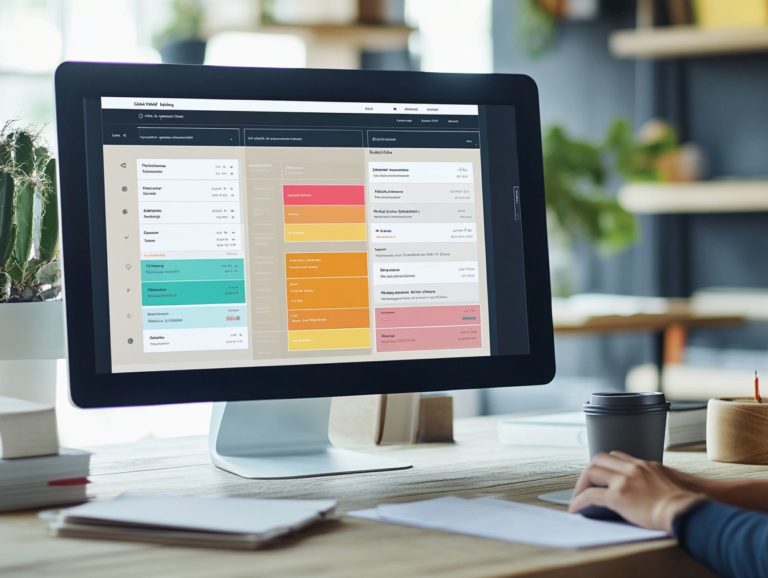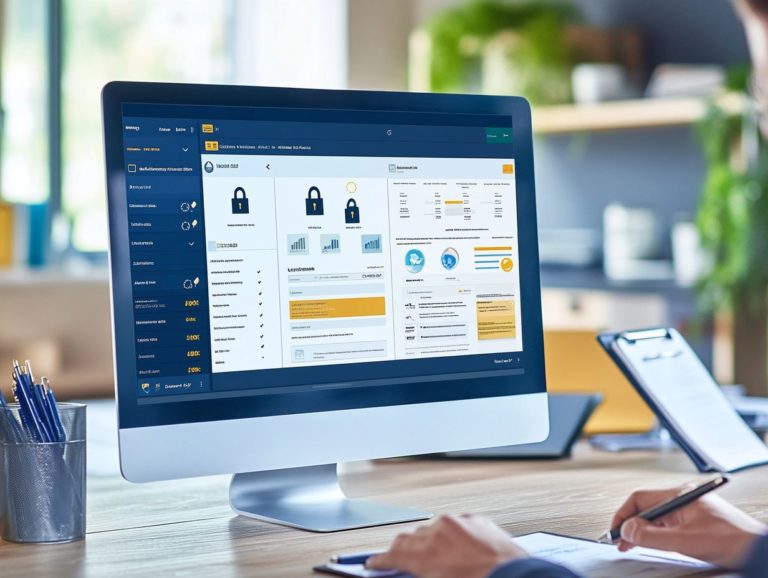What is the Importance of CRM in B2B?
In today s dynamic B2B landscape, mastering customer relationship management (CRM), which helps businesses manage their interactions with customers, is crucial for building lasting relationships and driving substantial growth.
This article delves into the fundamental principles of CRM, emphasizing its advantages in boosting customer retention and streamlining your sales processes. You ll discover practical steps for using effective CRM strategies, essential metrics to gauge your success, and common challenges you might encounter along the way.
We will also look at the future of CRM, spotlighting emerging trends and technologies poised to transform how you engage with your clients.
Embrace the opportunity to unlock the full potential of CRM in your B2B operations right now!
Contents
Key Takeaways:

- CRM is essential for building strong relationships with B2B customers, improving retention and loyalty.
- Implementing CRM can streamline sales and marketing processes, saving time and resources.
- To ensure success, track important metrics and address potential challenges when implementing CRM in B2B.
Understanding CRM in B2B
Understanding CRM in B2B is essential for any organization aiming to elevate its Customer Relationship Management strategies and refine its sales cycle efficiency. To learn more about how CRM impacts retention, check out the importance of CRM in retention.
When you integrate CRM systems, you streamline your data management processes, strengthen customer interactions, and effectively handle customer data. This boosts organizational efficiency and grants you a competitive edge in the market.
By leveraging CRM tools, you can align your sales teams and marketing strategies, creating a unified platform for generating and nurturing high-quality leads.
Defining Customer Relationship Management
Customer Relationship Management (CRM) is a powerful blend of technology and strategy that you can leverage to manage your interactions with both current and potential customers, particularly in B2B environments.
This approach encompasses various components, such as enhancing the customer experience and implementing efficient data management practices. Utilizing software as a service (SaaS) tools empowers your teams to coordinate and streamline their efforts effectively.
By using these elements, you can build stronger relationships, analyze customer behavior, and personalize your communication in meaningful ways.
Consider popular CRM platforms like:
- NetHunt CRM
- Zoho CRM
- HubSpot CRM
Each of these options offers unique features tailored to meet different organizational needs, enabling seamless integration with your workflows while providing valuable insights that can drive your decision-making process.
Benefits of CRM in B2B
Implementing CRM systems in B2B environments presents you with a wealth of advantages, notably enhanced customer retention and loyalty elements that are essential for fostering long-term business growth.
Improved Customer Retention and Loyalty
Improved customer retention and loyalty are among the most significant benefits you’ll reap from implementing a robust CRM strategy in the B2B sector. By effectively utilizing CRM systems, you can cultivate long-term relationships with your clients, honing in on techniques that build trust and rapport.
At the core of these strategies lies effective relationship management, enabling you to understand client needs on a deeper level. Personalized communication think tailored emails or targeted offers based on individual preferences enhances the customer experience, demonstrating to clients that they are truly valued.
Consistent engagement through regular check-ins, feedback requests, and relevant content can significantly boost customer loyalty. Over time, these practices foster an emotional connection, reinforcing trust and encouraging clients to choose your brand over competitors.
Streamlined Sales and Marketing Processes

Streamlined sales and marketing processes are crucial for maximizing efficiency and overall performance, especially in today s competitive B2B landscape.
Integrating CRM systems is a game-changer as it gives your teams the power to coordinate their efforts seamlessly. By centralizing data, you gain access to real-time insights into customer behavior and preferences, allowing you to tailor strategies that truly resonate with your target audience.
The automation features within these systems simplify repetitive tasks that can consume your time, freeing you up to focus on high-impact activities that drive results.
This seamless data-sharing capability enhances your sales pipeline and provides measurable performance metrics, enabling you to adapt and refine your approaches for even better outcomes.
Implementing CRM in B2B
Implementing CRM in B2B requires careful planning and execution of steps that fit the specific needs of B2B businesses, ensuring a smooth transition and effective integration across sales teams and marketing departments.
Careful navigation of this process sets the stage for success, maximizing the potential of your CRM to enhance collaboration and drive results.
Key Steps and Considerations
Successful CRM implementation demands careful planning and execution of several crucial steps tailored for B2B organizations.
Identifying lead scoring mechanisms methods to prioritize potential customers based on their value is essential, ensuring your sales efforts are directed towards the most promising opportunities.
Staying vigilant about compliance is also important, as adhering to data protection regulations safeguards customer information.
Effective information sharing between teams enhances collaboration and streamlines workflows, fostering a culture of transparency.
Robust customer support plays a pivotal role in this journey, empowering users to navigate the system with confidence, which significantly influences overall adoption rates.
By integrating these elements, your B2B organization can markedly elevate CRM effectiveness.
Measuring the Success of CRM in B2B
Measuring CRM success is key for any B2B organization aiming for growth! It’s essential for assessing return on investment and gauging overall effectiveness in relationship management.
Important Metrics to Track
Tracking essential CRM metrics is crucial for understanding customer satisfaction, lead qualification, and the overall effectiveness of your sales cycle. By diligently monitoring these key performance indicators, you can uncover valuable insights into customer experiences and preferences.
Customer satisfaction scores reveal how well your products or services align with client needs, guiding you toward future enhancements. Meanwhile, keeping an eye on lead qualification rates allows your sales team to pinpoint which prospective clients are most likely to convert, enabling a more focused approach.
Additionally, metrics related to the sales cycle like average deal size and time to close provide critical feedback for refining your sales strategies. Taken together, these metrics serve as a guide, steering you toward well-considered choices and enhanced operational efficiency.
Common Challenges and Solutions

Common challenges in CRM implementation can significantly impede the effectiveness of the system if not addressed with strategic solutions tailored to the unique needs of B2B organizations.
Act now to tackle these challenges and ensure your CRM system works at its best, propelling your business to success!
Addressing Potential Obstacles
Addressing potential obstacles in using CRM systems can greatly enhance your user training and data accuracy. It also improves overall organizational efficiency. However, the journey is not without challenges.
User resistance often surfaces as employees feel overwhelmed by new systems. This creates reluctance in adoption. To counter this, it s essential to foster a culture of acceptance. Hands-on training sessions and demonstrating how the CRM simplifies their daily tasks can significantly encourage engagement.
Data inconsistencies may also arise from improper input or insufficient training. Establishing clear guidelines for data entry and conducting regular audits will help maintain accuracy.
Customer support is crucial for providing ongoing assistance and troubleshooting any obstacles users may encounter. This ensures a smoother transition and sustained productivity throughout the organization.
The Future of CRM in B2B
The future of CRM in B2B is set to undergo a remarkable transformation. This change is shaped by emerging trends and technologies that emphasize data-driven strategies for elevating customer engagement.
Emerging Trends and Technologies
Emerging trends and technologies in CRM are revolutionizing how B2B organizations manage customer engagement. As you integrate artificial intelligence and automation into these systems, you ll discover new opportunities to enhance personalization and predictive analytics.
By leveraging these advancements, you can anticipate customer needs and behaviors. This allows you to tailor your interactions with remarkable precision. Such transformation creates stronger relationships and boosts efficiency, allowing your team to focus on what matters most!
This evolving landscape prompts B2B companies to rethink their customer service strategies. This ensures you stay competitive in an ever-changing market.
Frequently Asked Questions
What is the Importance of CRM in B2B?

CRM, or Customer Relationship Management, helps businesses manage customer information and interactions. It plays a crucial role in B2B by improving relationships with customers and potential customers.
How does CRM help in B2B?
CRM helps in B2B by tracking and storing important customer data. It provides insights for targeted marketing and sales efforts and improves overall customer experience.
Why is CRM important for B2B sales?
CRM offers a centralized platform for managing leads and tracking interactions with customers. This leads to more efficient and effective sales processes.
Can CRM benefit B2B marketing efforts?
Yes! CRM can greatly benefit B2B marketing by providing valuable customer data and insights for targeted marketing campaigns. It also helps measure the success of marketing efforts.
How does CRM improve customer relationships in B2B?
CRM allows businesses to better understand their customers’ needs and preferences. This leads to more personalized and effective communication, resulting in stronger and more loyal relationships.
What are the long-term benefits of using CRM in B2B?
Using CRM in B2B helps improve customer retention and increase sales. This results in long-term benefits such as enhanced overall customer satisfaction, increased revenue, and growth opportunities.
In conclusion, adopting CRM systems offers many benefits for B2B organizations. By leveraging these tools, you can enhance customer relationships, streamline operations, and drive growth. Explore CRM solutions today to take your business to the next level!






